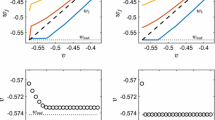Abstract
For an infinite horizon economy with complete contingent markets, bankruptcy risk and default penalties (given by linear loss in utils), Araujo and Sandroni (Econometrica 67(3): 663–672, 1999) and Araujo et al. (J Econ Theory 165:242–256, 2016) show that if agents’ posteriors of their average probabilistic beliefs do not converge in the long run, then a competitive equilibrium without bankruptcy does not exist. The first contribution of this paper is to show that even if all agents have homogenous beliefs, existence of an equilibrium is guaranteed only under stringent conditions on default penalty rates. In order to discourage agents from making promises that they know in advance they will not be able to honor, default penalty rates must be large enough. Are the “real-life” default penalties sufficiently harsh? Since utility penalties are difficult to measure in practise, we propose to address this question by replacing the “reduced-form” linear loss in utils by pecuniary punishments in the line of Kehoe and Levine (Rev Econ Stud 60:865–888, 1993). We show that, independently of the severity of the pecuniary punishment, an equilibrium without bankruptcy never exists.
Similar content being viewed by others
References
Aliprantis, C.D., Border, K.C.: Infinite-Dimensional Analysis, 2nd edn. Springer, Berlin (1999)
Alvarez, F., Jermann, U.J.: Efficiency, equilibrium, and asset pricing with risk of default. Econometrica 68(4), 775–797 (2000)
Araujo, A., da Silva, P., Faro, J.H.: Ambiguity aversion in the long run: “to disagree, we must also agree.” J. Econ. Theory 165, 242–256 (2016)
Araujo, A., Páscoa, M.R., Torres-Martinez, J.-P.: Collateral avoids Ponzi schemes in incomplete markets. Econometrica 70(4), 1613–1638 (2002)
Araujo, A., Sandroni, A.: On the convergence to homogeneous expectations when markets are complete. Econometrica 67(3), 663–672 (1999)
Arrow, K.J., Debreu, G.: Existence of an equilibrium for a competitive economy. Econometrica 22(3), 265–290 (1954)
Bulow, J., Rogoff, K.: Sovereign debt: Is to forgive to forget? Am. Econ. Rev. 79(1), 43–50 (1989)
Dana, R.A.: Existence and uniqueness of equilibria when preferences are additively separable. Econometrica 61(4), 953–957 (1993)
Dubey, P., Geanakoplos, J.: Liquidity and bankruptcy with incomplete markets. Cowles Foundation Discussion paper (1989)
Dubey, P., Geanakoplos, J., Shubik, M.: Default and punishment in general equilibrium. Econometrica 73(1), 1–37 (2005)
Eaton, J., Gersovitz, M.: Debt with potential repudiation: theoretical and empirical analysis. Rev. Econ. Stud. 48(2), 289–309 (1981)
Geanakoplos, J.: The Economy as an Evolving Complex System II, Addison-Wesley, chapter Promises, promises, pp. 285–320 (1997)
Geanakoplos, J., Zame, W. R.: Collateral and the enforcement of intertemporal contracts. Cowles Foundation Discussion paper (2002)
Kehoe, T., Levine, D.K.: Debt-constrained asset markets. Rev. Econ. Stud. 60(4), 865–888 (1993)
Klibanoff, P., Marinacci, M., Mukerji, S.: A smooth model of decision making under ambiguity. Econometrica 73(6), 1849–1892 (2005)
Klibanoff, P., Marinacci, M., Mukerji, S.: Recursive smooth ambiguity preferences. J. Econ. Theory 144(3), 930–976 (2009)
Kubler, F., Schmedders, K.: Stationary equilibria in asset-pricing models with incomplete markets and collateral. Econometrica 71(6), 1767–1793 (2003)
Maccheroni, F., Marinacci, M., Rustichini, A.: Ambiguity aversion, robustness, and the variational representation of preferences. Econometrica 74(6), 1447–1498 (2006)
Riedel, F.: Arrow-Debreu equilibria with asymptotically heterogeneous expectations exist. Econ. Theor. 21(4), 929–934 (2003)
Zame, W.R.: Efficiency and the role of default when security markets are incomplete. Am. Econ. Rev. 83(5), 1142–1164 (1993)
Author information
Authors and Affiliations
Corresponding author
Additional information
Publisher's Note
Springer Nature remains neutral with regard to jurisdictional claims in published maps and institutional affiliations.
This paper has been written in honor of Nicholas C. Yannelis’ tremendous contributions to Economic Theory. We thank two referees for helpful comments and suggestions. Any remaining errors are, of course, ours. Financial support from CNPq is gratefully acknowledged.
Rights and permissions
About this article
Cite this article
Martins-da-Rocha, V.F., Rosa, R.M. Complete markets with bankruptcy risk and pecuniary default punishments. Econ Theory 75, 625–640 (2023). https://doi.org/10.1007/s00199-022-01429-1
Received:
Accepted:
Published:
Issue Date:
DOI: https://doi.org/10.1007/s00199-022-01429-1
Keywords
- Competitive general equilibrium
- Complete contingent markets
- Risk of bankruptcy
- Pecuniary default penalties
- Beliefs




